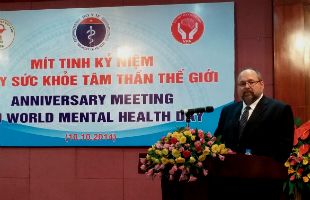
Madam Nguyen Thi Doan, Vice-President of Viet Nam;
Madam Nguyen Thi Xuyen, Vice-Minister of Health;
Prof. Tran Van Cuong, Chairperson of Viet Nam Mental Association;
Distinguished guests;
Ladies and Gentlemen
Mental well-being is a fundamental component of WHO’s definition of health. Good mental health enables people to realize their potential, cope with the normal stresses of life, work productively, and contribute to their communities.
Unfortunately, mental health trends, with estimated 13% global burden of disease, and low level of funding, less than USD 2 per person per year globally and less than 25 cents in low-income countries, reflect long-standing neglect of mental health services and care, abuses of human rights and discrimination against people with mental disorders and psychosocial disabilities.
We gather here today to mark the World Mental Health Day observed on 10 October every year, with the main objective of raising awareness of mental health issues and mobilizing efforts in support of mental health.
The theme for this year is “living with Schizophrenia” with aim to campaign for equity for people with schizophrenia, to address stigma and prejudice that people with schizophrenia and other mental illnesses experience.
Schizophrenia is one of the most common severe mental disorders. The disease affects around 26 million people across the world and there are over some hundred thousand people living with schizophrenia in Viet Nam.
People with schizophrenia can have a good outcome if early and appropriate health and socio-economic opportunities are available. This includes access to housing, education, recreation, employment, spirituality and social relationships. In other words, the same life experiences that should be experienced by all - their human rights.
Despite being a treatable disorder, more than half of people with schizophrenia cannot access adequate treatment, and vast majority of people with untreated schizophrenia live in the developing world.
Viet Nam has shown remarkable progress in expanding community-based services and making them available for about 80% of communes. However many challenges remain. Rehabilitation and social support for people living with schizophrenia remains limited.
The Mental Health Action Plan 2013-2020 endorsed by the World Health Assembly focused international attention on a long-neglected problem including schizophrenia with a welcome sense of urgency. It was a signal that mental health deserves much higher strategic priority.
It is thus rewarding to note Viet Nam’s work to get an action plan right through ongoing development of a National strategy on mental health 2015-2020 with a vision to 2030.
I sincerely hope that this National strategy will embrace the principles set forth in the action plan: more effective leadership and governance for mental health; the provision of comprehensive, integrated mental health and social care services in community-based settings; implementation of strategies for promotion and prevention; and strengthened information systems, evidence and research.
Ladies and Gentlemen,
Collectively we can improve the lives of people living with schizophrenia and other mental health disorders. I hope this international scientific conference will provide practical guidance and act as a catalyst for change in further strengthening of mental health care and giving many millions of people in Viet Nam a chance for a health life, in all its dimensions.
Thank you
Mr Jeffery Kobza
